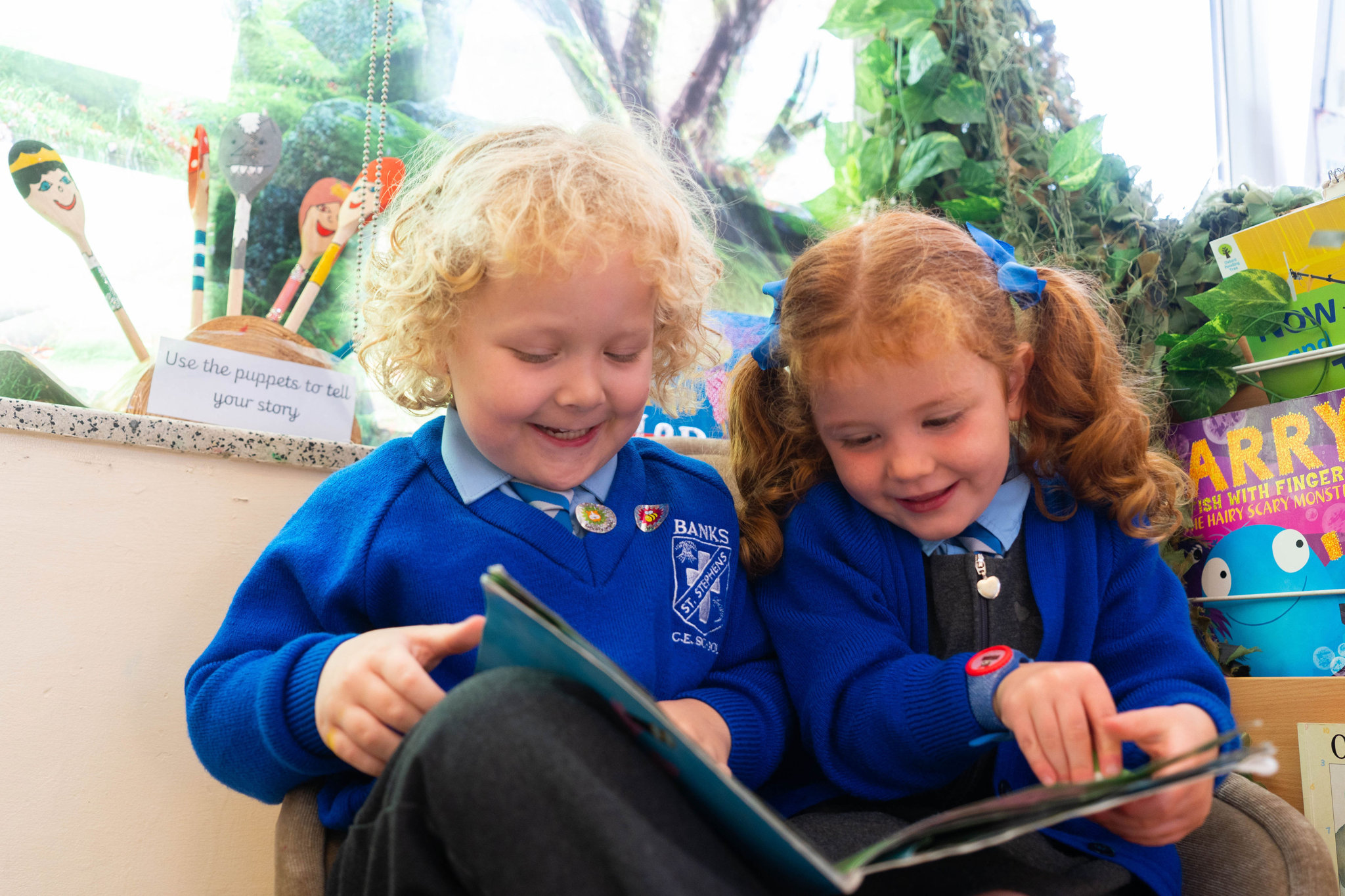EARLY YEARS FOUNDATION STAGE CURRICULUM

INTENT STATEMENT
In the Early Years at Bank St Stephen’s Church of England Primary School we want children to be happy, confident, well rounded individuals with a love for learning. We believe in providing all children with a safe and stimulating environment that builds on individual’s wants, needs, and interests and aim to give the children a sense of belonging in the wider school community.
Learning through play should be fun, engaging and promote children’s natural curiosity whilst providing suitable challenge. We aim to encourage children to take turns, share and be thankful to one another and to God, committing to our Christian values. We value the importance of our outdoor environment and believe that it offers children the opportunity to develop their thinking and problem-solving skills.
We are committed to providing the best possible start to school life, teaching them skills, and giving them experiences that will ensure their well-being now and success in the future.

EYFS CURRICULUM
The Early Years Foundation Stage (EYFS) marks a critical time in a child’s early development. All early years’ providers must comply with the Government’s Statutory Framework for the Early Years Foundation Stage, which sets out the standards for learning, development and care for children aged 0-5.
The Framework identifies the most effective ways that children learn, called “The Characteristics of Effective Learning”:
Overarching principles
Four guiding principles should shape practice in early years settings. These are:
• Every child is a unique child, who is constantly learning and can be resilient, capable, confident and self-assured
• Children learn to be strong and independent through positive relationships
• Children learn and develop well in enabling environments with teaching and support from adults, who respond to their individual interests and needs and help them to build their learning over time. Children benefit from a strong partnership between practitioners and parents and/or carers.
• Importance of learning and development. Children develop and learn at different rates.
The framework identifies seven areas of learning, which are broken down into prime and specific areas of learning. These areas are particularly important for building a foundation for igniting children’s curiosity and enthusiasm for learning, forming relationships and thriving.
The prime areas are:
- Communication and language (giving children opportunities to experience a rich language environment; to develop their confidence and skills in expressing themselves; and to speak and listen in a range of situations).
- Physical development (providing opportunities for young children to be active and interactive; and to develop their co-ordination, control, and movement. Children must also be helped to understand the importance of physical activity, and to make healthy choices in relation to food).
- Personal, social and emotional development (helping children to develop a positive sense of themselves and others; to form positive relationships and develop respect for others; to develop social skills and learn how to manage their feelings; to understand appropriate behaviour in groups; and to have confidence in their own abilities).
The specific areas are:
- Literacy (reading and writing – encouraging children to link sounds and letters and to begin to read and write).
Mathematics (counting, understanding and using numbers, calculating simple addition and subtraction problems, describing shapes, spaces and measure). We use the Letters and Sounds scheme, which is a systematic approach for teaching children to read using phonics. - Understanding the world (guiding children to make sense of their physical world and their community through opportunities to explore, observe and find out about people, places, technology and the environment).
- Expressive arts and design (enabling children to explore and play with a wide range of media and materials, as well as providing opportunities and encouragement for sharing their thoughts, ideas and feelings through a variety of activities in art, music, movement, dance, role-play, and design and technology).
By the time they reach the end of the EYFS stage, children should have achieved the 17 Early Learning Goals, which encapsulate the knowledge, skills and understanding they should have at the end of the academic year in which they turn five.
The EYFS at Banks St Stephen’s Church of England Primary School provides children with a rich variety of learning and teaching experiences that are appropriate to their needs and interests and underpin all of their future learning. Through planned, purposeful play, children are able to discover, practise and refine their skills in literacy and mathematics, as well as find out about themselves and their environment. They practise and build up their ideas, learn how to control themselves and begin to understand the need for the rules that help them make sense of the world. They are encouraged to think creatively and independently.
The Early Years team works closely to deliver a curriculum that provides a balance across the areas of learning from Nursery to the end of the Reception year.
Observations are undertaken regularly, which then inform the Foundation Stage Profile. This is a national assessment tool and allows teachers to summarise children’s progress towards the Early Learning Goals. We use the Lancashire document “A Framework to Support Curriculum Planning”, which breaks the Early Learning Goals down into more detailed key learning, and also the new “Birth to Five Matters” document to inform our planning and assessment throughout the Early Years at Banks St Stephen’s.
Through the use of regular assessments, teachers are able to plan and deliver learning opportunities according to pupils’ needs. As a collection of assessment data is a statutory requirement, both teachers and other adults make regular observations and record their findings against the Foundation Stage Profile. During the first term in the Reception class, the teacher assesses the ability of each child, using the Foundation Stage Profile. These assessments allow staff to adjust the teaching programme for individual children and groups. The information contained in the profile is shared at our parental consultation meetings.
/files/Nursery_Long_Term_Plan_2021-2022.doc
/files/Reception_2021_-_2022_Long_Term_Overview.doc
Click here for EYFS Parents' Guide
Click here for What to Expect and When Guide for Parents
/files/EYFS_Policy_September_2021_(1).docx
/files/the-early-years-foundation-stage-eyfs-2021-a-guide-for-parents-and-carers-august-2021-.pdf
.png)





